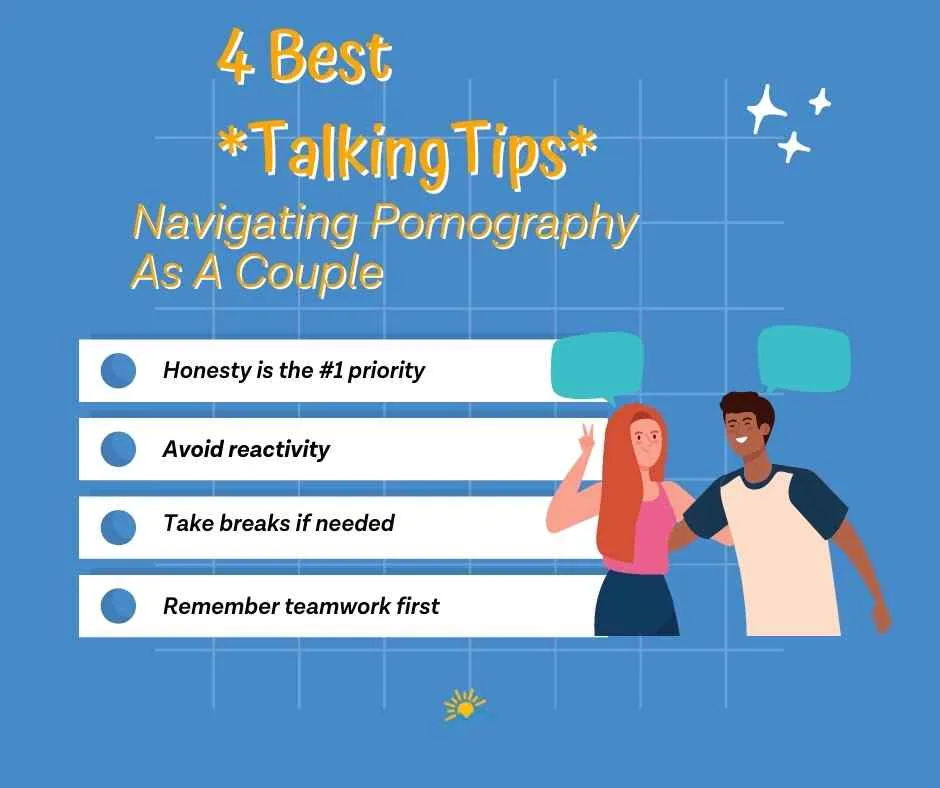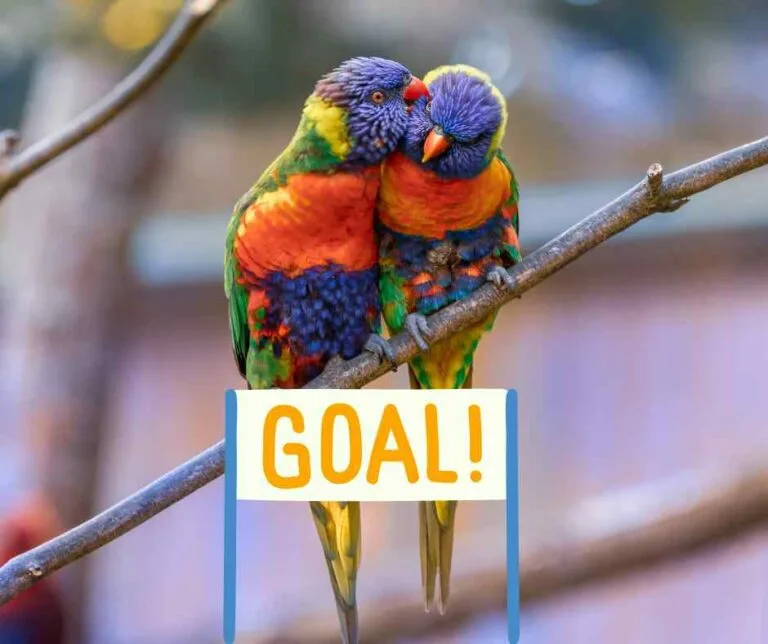While watching pornography on a regular basis can have detrimental effects on the individuals who watch it, perhaps the greatest cost to happiness tied to pornography viewing is the toll it takes on romantic relationships.
Some would claim that watching pornography is a harmless activity that doesn’t really hurt anyone. Other argue that watching porn together as a couple may even improve a stalled relationship. The reality is much different.
Watching porn has been linked to lower relationship satisfaction, lower sexual satisfaction, higher risk of divorce, less general stability in a relationship, and negative sexual dynamics. The bottom line is that porn puts your relationship at risk.
Navigating pornography as a couple has pitfalls. This conversation guide is designed help you have an open and honest relationship that can resist the negativity that porn creates.
How is porn influencing you and your relationship as a couple?
Before having a conversation about porn with your relationship partner, a quick overview of what watching porn is doing to the people watching it may be helpful. You already know that watching porn puts your relationship at risk and can harm your relationship. But why? How can watching a few videos that seem harmless when no one’s around really make a difference?
The key to these research findings lies in understanding how your brain processes media of any kind. Anytime we watch a movie, television show, or any video, your brain tries to process that information and learn from it.
Our brains are a wonderful and miraculous organ, designed to learn, grow, and develop when presented with new stimuli. The more realistic the stimulus (at least to the brain), the more the brain will try to learn from it. This is why you tend to be more influenced by watching a drama on television compared to a superhero movie. When your brain thinks it’s watching real people in realistic scenarios, it’s more likely to be influenced.
When watching porn, your brain is doing the same thing, trying to learn. You are watching people engage in some form of sexual intimacy and your brain assumes there is something to learn from this situation. Subconsciously, your brain thinks it’s learning about what men and women want, what they look like, and how couples are supposed to act.
The problem is simple, real couples don’t act like the people in porn. They also don’t look like the people in porn. In fact, porn often shows sexual intimacy as overly aggressive, as an act that ignores love and consent, and an act that ignores the emotional connection sex experts agree is vital to healthy relationships.
This all creates a “learning” environment where your brain is learning and changing its expectations about love and sex in ways that will make it harder and less likely for you to be happy in your actual romantic relationships. This is why scientists believe porn is linked to less satisfaction and stability in relationships.
Your brain can’t reconcile your real relationship from the fake relationship its learned about from porn! While we’d all like to assume we are the exception to the rule and that watching porn doesn’t affect us, research suggests otherwise. Like it or not, your brain is absorbing lessons from porn and trying to apply them in your real relationship.

A note on couple pornography use
It is very common for couples and even some therapists to claim that using porn together as a couple avoids the negative effects of porn and may even help improve one’s relationship. While it is true that couple pornography use has fewer negative effects than individual use, experts have still linked couple pornography use to negative relationship outcomes such as less relationship stability.
Bottom-line, research has found no evidence for a type of porn use that doesn’t carry risks. In fact, researchers have found again and again that couples who have the happiest and healthiest relationships are ones where both partners avoid porn. If you care about your relationship and want the greatest likelihood of success and happiness, research suggest you should avoid porn at all costs.
Step one toward navigating pornography as a couple - open the conversation
With a little knowledge out of the way, let’s jump into to talking with your partner about porn. While some couples include two people who have little to no experience watching porn and other couples include two partners who both watch porn regularly, by far the most common pattern is a couple where one partner has a history of watching porn regularly while the other partner does not.
Overwhelmingly, it is often the male partner who watching porn while the female partner does not. For this reason, this guide is aimed at couples where one partner is using or has used porn and the other is not.
This dynamic is one of the reasons talking about porn in a relationship can be hard and stressful. Both partners may have very different attitudes and experiences with porn. However, open communication about porn is one of the critical conversations all couples need to have. In today’s world, the porn conversation is no longer optional!
Here are a few guidelines and tips to these conversations, whether it’s your first time or the 100th:

1. Honesty is the #1 priority.
Like most communication in a relationship, being 100% honest with your partner is crucial. While it may be stressful and scary to disclose porn use your partner does not know about, hiding this use and lying to your partner will always end up making things worse, not better. Be honest, be open, and trust the love and commitment you have together.
2. Reactivity needs to be avoided.
On the other hand, learning about a partner’s porn watching or history can lead to what experts call reactivity. This is when we get flooded with stress or negative emotions and lash out at our partner. Learning about porn use can feel like a violation of trust in a relationship. That’s okay and those feelings are real but try to avoid attacking or letting angry outbursts define these conversations. This will only shut down lines of communication with your partner.
3. Take breaks if needed.
These conversations can sometimes be hard and emotional. If you find yourself feeling too much stress or having a hard time staying positive, take a break. A break means that you agree to come back to the conversation, not avoid it. If you’re going to take a break, set a time frame to return to the conversation. It may be 5 minutes, an hour, or even the next day, but make the break clear and stick to it.
4. Remember teamwork above all else.
Couples thrive when they work together. Navigating pornography as a couple should be no different. Even if you and your partner are coming from two very different places and backgrounds, focus on how you can work together toward a solution. Allow this topic to bring you together, not drive you apart. Too many couples have been destroyed because of porn, don’t let it claim another victim!

A conversation guide: steps for both partners
Time to talk! This guided conversation starter will give you and your partner questions to answer and a basic outline for how a healthy conversation about porn should go. Answer the questions you feel like are helpful and skip ones you feel are not applicable to your relationship (don’t skip the hard ones! Remember, you need to be open and honest about this topic!).
This guide is split between the partner with a current or history of porn and the other partner. When it is one person’s turn to speak, your job is to listen. You can ask clarifying questions but try to avoid responding with your thoughts or emotions until it is your turn to speak. This guide starts with the porn viewing partner, then gives the other partner a chance to speak, before ending with some discussion questions to talk through together.
Questions for the partner using porn:
Explain to your partner how you first got introduced to porn.
What was the context?
What happened afterward?
Describe generally what your pattern of porn use has been since then.
Have there been periods of abstinence?
Has your frequency of porn viewing increased or decreased during certain periods of time?
When was the last time you viewed porn?
Explain the context and why you think you viewed porn.
Questions for the non-porn viewing partner:
What things are you afraid of when it comes to pornography in our relationship?
What are you afraid of for yourself?
What are you afraid of for your relationship?
What are you afraid of for your partner?
How does your partner’s porn use make you feel?
What would you like your partner to do moving forward?
What can you do to help facilitate these goals?

Discussion questions together: navigating pornography as a couple
Do we think about porn the same way and have similar attitudes toward it?
If not, where is the common ground?
If not, can we talk through those differences to get more on the same page?
What are you goals for the next month?
A guide for follow-up conversations
Talking about porn is not just a one-time conversation. In fact, if most couples talk about porn at all, they often have a single awkward conversation and then never talk about it again. It is important that you follow-up your first conversation with another one (and then another, and another…).
The nature of this follow-up conversation will depend on your relationship and the specific issues you are working and talking through. However, following the rough template below can help keep your conversations on track and make sure you are talking about the most important things to help your relationship succeed moving forward.
Questions for the partner using porn:
Have I had any relapses or viewed porn since the last time we had a talk about porn?
If so, explain the nature and circumstances of the use.
What do I feel like I have accomplished since the last time we spoke?
What do I feel like I still need to work on moving forward?
Questions for the non-porn viewing partner:
Have any other concerns or fears come to my mind since the last time we spoke?
What do I feel like I have accomplished since the last time we spoke?
What do I feel like I still need to work on moving forward?
Discussion Questions Together:
How have we done on the goals we set for last time?
What can we do better as we move forward together?
Are there any new goals we want to set together?
This basic framework can help you continue to have important and open conversations about porn moving forward. Remember, talking openly will help prevent porn from overtaking your relationship! Work together and build the type of relationship you both want to have.
14-Day Free Trial
Protection From Pornography
Change your habits, change your life: Start our 14-day free trial to help get rid of pornography for good.





